Today Tucker Carlson got fired and tomorrow I get cured of cancer.¹ The week is shaping up nicely. What's on tap for Wednesday?
¹Sort of.
Cats, charts, and politics

Today Tucker Carlson got fired and tomorrow I get cured of cancer.¹ The week is shaping up nicely. What's on tap for Wednesday?
¹Sort of.
I'm not pretending to be obtuse here, but what's up with this headline in the Washington Post?
 I know it's traditional to assume that the president is the one "responsible" for the debt ceiling, but why? It's a problem for the country, not the presidency. The leaders of Congress are running out of time at least as much as Biden is.
I know it's traditional to assume that the president is the one "responsible" for the debt ceiling, but why? It's a problem for the country, not the presidency. The leaders of Congress are running out of time at least as much as Biden is.
More, in fact, since Congress is the body actually charged with setting the debt ceiling. If it doesn't get raised, it's on them as much or more than it's on the president.
And because this should be said every time the debt ceiling is mentioned, we really need to get rid of it. The time to argue about spending is when you buy stuff, not when the bills come due. Unless you're a deadbeat, you pay up if you've promised to, and you don't make your payment subject to random, changing demands. You said you'd pay. You pay.
Today was potentially a milestone: my last chemotherapy session ever. I've now finished the three days of chemo prep required for the CAR-T procedure, which is followed by a rest day on Sunday and then a few final tests on Monday. Assuming everything checks out, Tuesday is Day 0, when the CAR-T starts. If it works—which we won't know for several months—I will be close enough to cured that I'll be free of chemo treatments for at least the next few years.
Today the Washington Post tells the story of Joe Moss, a Republican and conservative Christian who engineered a takeover of the Ottowa County board of commissioners in Michigan. It all started in church:
They settled into the pews and listened as their pastor warned of the “many people” in the country who were “trying to destroy everything that is righteous and good and pure and holy.” They were the sort, he said, who were demanding free condoms at school, “gender fluidity books” in the public library and drag queen story hours.
By his own admission, Moss had not paid much attention to local politics. He ran a small technology business and was focused on raising his children. Then, in the fall of 2020, the Ottawa County health department learned of a coronavirus outbreak at his daughter’s Christian school and ordered the school’s leaders to comply with the governor’s mask mandate. When they refused, state and county officials chained shut the school’s doors for more than a week and warned parents that continued resistance could bring fines and imprisonment.
Suddenly, Moss realized that those dangerous people that his pastor had been talking about on Sundays were not just in Washington and Lansing, the state capital. They were in West Olive, where the county government was headquartered. “In 2020, I became a threatened parent,” Moss said on the campaign trail. “I was threatened specifically … by Ottawa County.”
"Hey grampa, did you really have a big pandemic back when you were a kid?"
"I wasn't a kid, but we sure did, Johnny."
"Were you scared?"
"Everyone was scared, Johnny. But some people were more scared than others."
"What were you scared of, grampa?"
"Well, most of us were scared of dying. But some of us were more afraid of masks."
"Masks don't seem very scary."
"Well, Johnny, fear is a funny thing. The masks were designed to protect other people in case you were sick, but some people refused to wear them because they were a little uncomfortable."
"It sounds like they were just assholes."
"Language, Johnny! But yes, they were assholes."
Bud Light has fired its VP of marketing. NRO's Jim Geraghty comments:
When the Bud Light controversy blew up, some of us contended the company had made a serious error, that alienated and repelled a certain portion of existing customers while not attracting significant numbers of new customers. We were assured that we were old and out of touch, and that sending a can to transgender influencer Dylan Mulvaney with Mulvaney’s face on it was a brilliant move that demonstrated that Bud Light was now the preferred taste of the young and sophisticated.
Well, it appears that Anheuser-Busch does not agree with the assessment that the Mulvaney move was a brilliant, cutting-edge marketing strategy.
Oh piss off. The only thing Anheuser-Busch and its VP of marketing failed to anticipate was the sheer vile and malevolence that animates the conservative movement these days. Doing a promotion with a trans woman hurts no one and violates no conservative principles. Dylan Mulvaney is not a child. She doesn't want to compete on a women's track team. She has no ideological message. Her Instagram video was entirely lighthearted and free of political content.
She's just an adult who wants to be left free to live her life. But that alone was enough to enrage the conservative movement into sputtering incoherence. The rabid hate that motivates this is beyond appalling.
This is Hilbert licking an unfortunate lizard in our backyard. I don't know why, since neither of our cats ever shows any interest in actually eating a lizard. They just like to play with them.
This one looks extremely dead, but no. After I hauled the cats indoors, he flipped over and made a getaway. It didn't last long since he was dumb enough to stick around and the cats found him again the next day, but I don't suppose lizards are known for their high IQ.
The deadline to raise the debt ceiling is getting closer, and investors are getting more jittery:
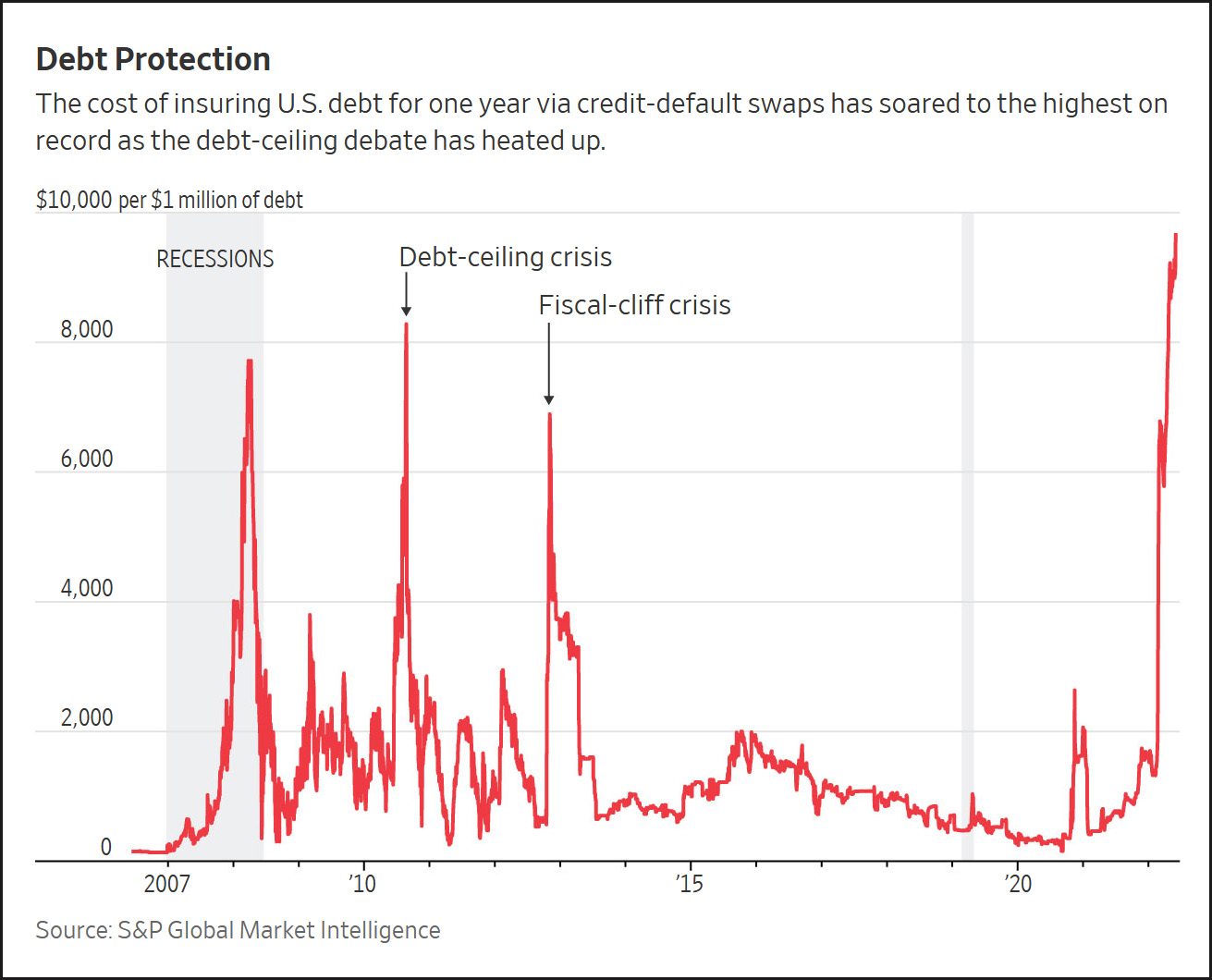 According to the Wall Street Journal's experts, the current cost of insuring treasury debt corresponds to a belief in a 2% chance of default. There are a whole lot of caveats about this, but the conclusion nonetheless is that things are getting dicey.
According to the Wall Street Journal's experts, the current cost of insuring treasury debt corresponds to a belief in a 2% chance of default. There are a whole lot of caveats about this, but the conclusion nonetheless is that things are getting dicey.
Meanwhile, Republicans fiddle while Washington DC burns.
Here at City of Hope, the hospital menu is pretty extensive and caters both to healthy eaters and to us normal people. They've got burgers and tuna melts. For breakfast you might want to try the French toast. You can have your sandwiches on white bread. Mayonnaise is liberally applied all over the place. They've got milkshakes and smoothies and fruit juice and coffee. Desserts include cookies, cake, ice cream, and pudding.
But one thing is a step too far:
 All that other stuff is OK, but if you'd like a nice, cold Coca-Cola with lunch? Sorry. Apparently that's one unhealthy habit they can't bring themselves to endorse.
All that other stuff is OK, but if you'd like a nice, cold Coca-Cola with lunch? Sorry. Apparently that's one unhealthy habit they can't bring themselves to endorse.
I wonder why? It's not the caffeine, since they have coffee on the menu. It's not the carbonation, since they have ginger-ale. It's not fake sugar since they have diet soda that's not colored brown. So what do you suppose is their objection to colas?
The decline of the US—or even of the West more generally—has been a persistent topic for years, and for some reason it's enjoying a mini-Renaissance right now. There is much talk, for example, that the dollar is losing its spot as the world's reserve currency. But it sure doesn't look like it:
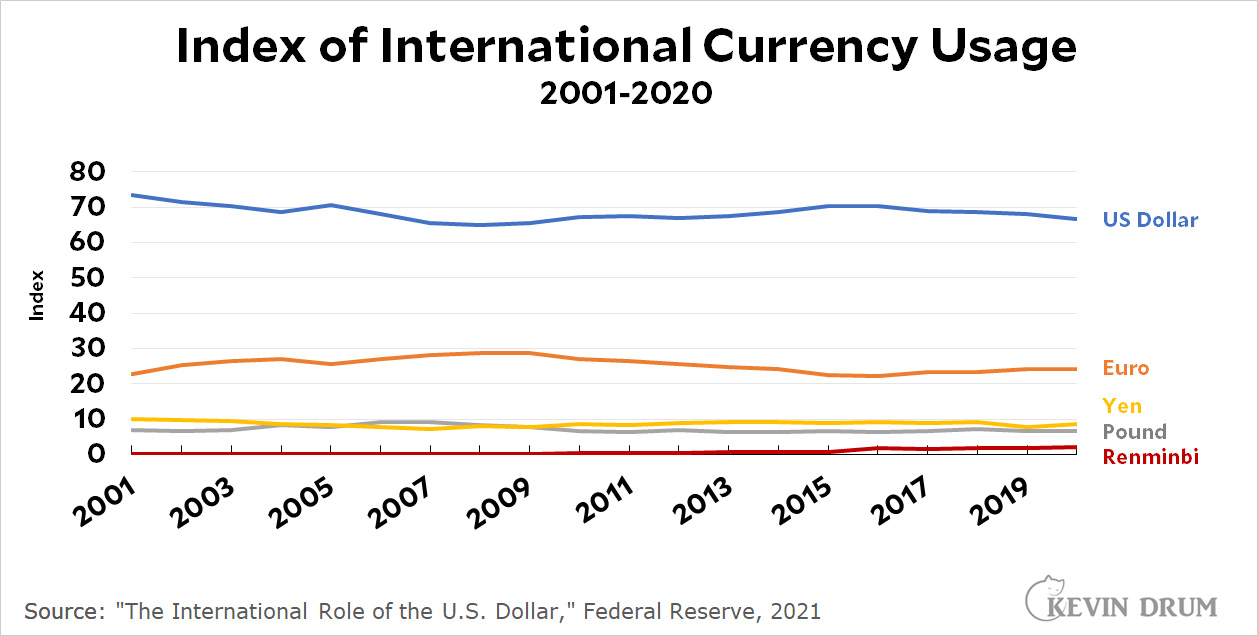 The dollar lost a bit of influence during the Iraq War years, but that came to a hard stop in 2007, when the economy collapsed. There's nothing like a world crisis to remind people why they liked dollars in the first place, is there?
The dollar lost a bit of influence during the Iraq War years, but that came to a hard stop in 2007, when the economy collapsed. There's nothing like a world crisis to remind people why they liked dollars in the first place, is there?
The value of the dollar is fundamentally backed by our economic performance. Let's take a look at both the level and growth of GDP in the best-performing countries:
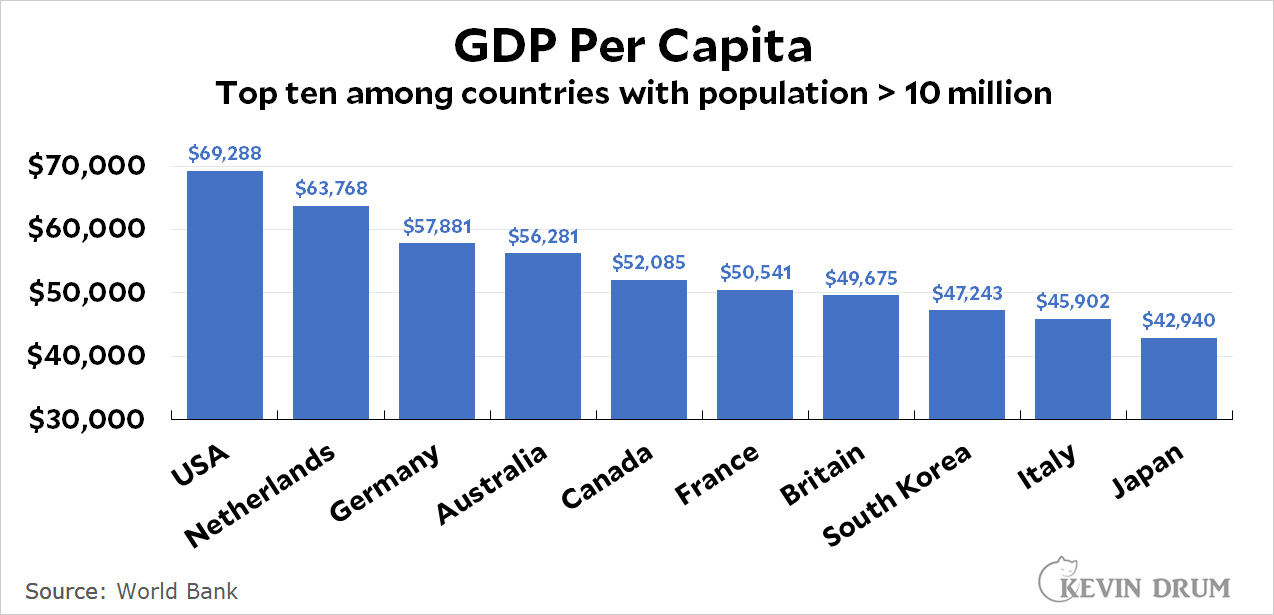
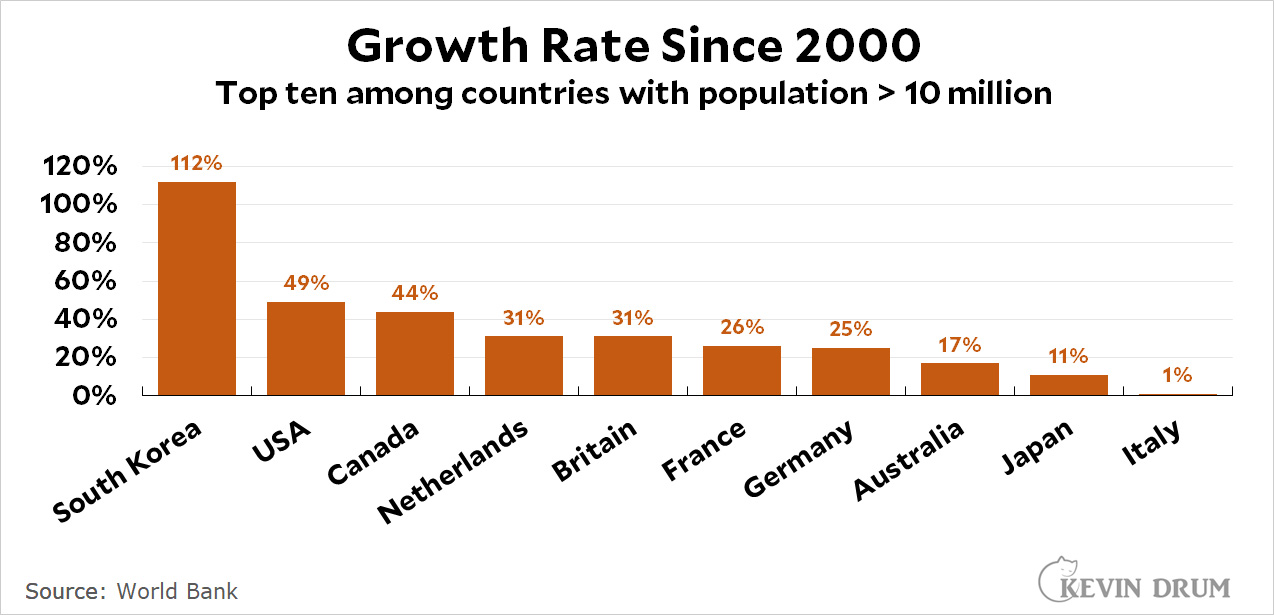 The US has the highest GDP per capita in the world among large-ish countries¹ and the fastest growth rate aside from South Korea, which started from a very low base.² You really ought to sit back for a minute and contemplate just how remarkable this is.
The US has the highest GDP per capita in the world among large-ish countries¹ and the fastest growth rate aside from South Korea, which started from a very low base.² You really ought to sit back for a minute and contemplate just how remarkable this is.
So our economy is not just big, it's also growing fast. And I hardly need to point out the well-known fact that we have a huge military to protect this economy:
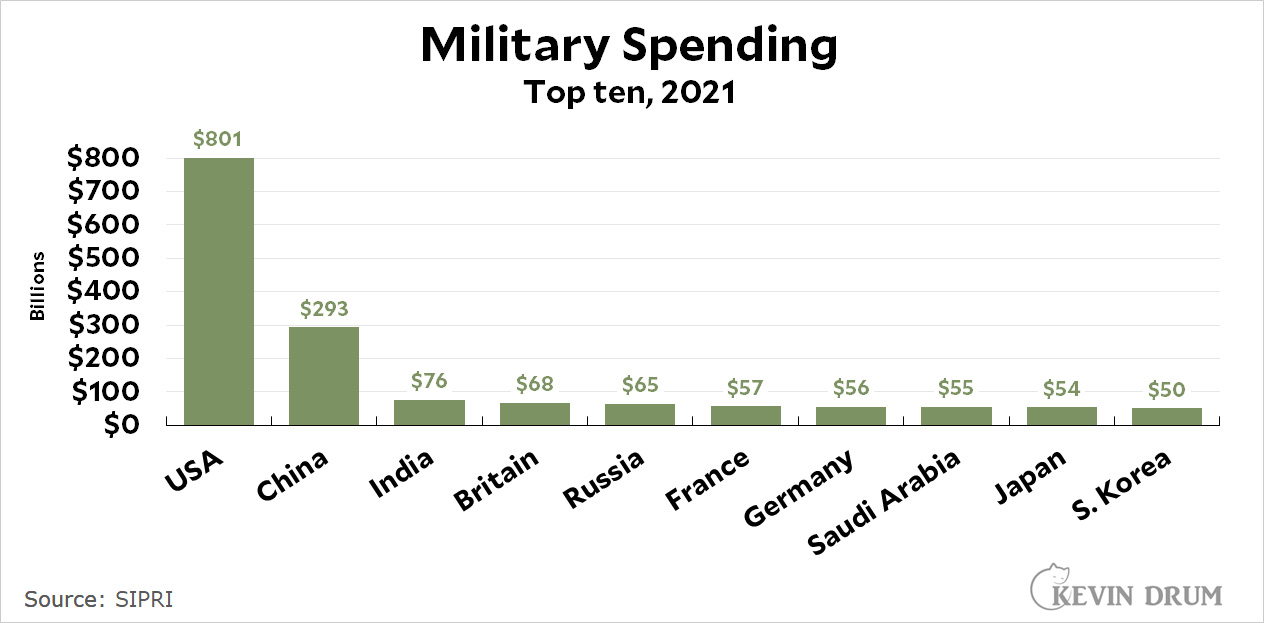 In fairness, despite the vast chasm between the US and China in military spending, it's an open question just how much it means. On the one hand, purchasing power parities and a cheap conscript-style army means China can field a lot more boots on the ground than we can. On the other hand, our technology is so far ahead of China's that we might outbulk them by more than 3:1 in real life. On the third hand, our military patrols the entire world while China's only has to patrol China itself and its nearby seas. On the fourth hand, the US potentially has all of NATO to call on in the case of a shooting war. On the fifth hand, it's not clear how vulnerable a classical navy like ours is to cheap, high tech drones and cruise missiles.
In fairness, despite the vast chasm between the US and China in military spending, it's an open question just how much it means. On the one hand, purchasing power parities and a cheap conscript-style army means China can field a lot more boots on the ground than we can. On the other hand, our technology is so far ahead of China's that we might outbulk them by more than 3:1 in real life. On the third hand, our military patrols the entire world while China's only has to patrol China itself and its nearby seas. On the fourth hand, the US potentially has all of NATO to call on in the case of a shooting war. On the fifth hand, it's not clear how vulnerable a classical navy like ours is to cheap, high tech drones and cruise missiles.
All this said, it mostly applies to a shooting war over, say, Taiwan, not a war on American territory. There's not much question that two big oceans and nearly a trillion dollars worth of military spending make us all but impregnable on our own territory. Short of a nuclear war, there's no safer place on earth.
Here's another thing to look at for the world's large economic powers: population growth.
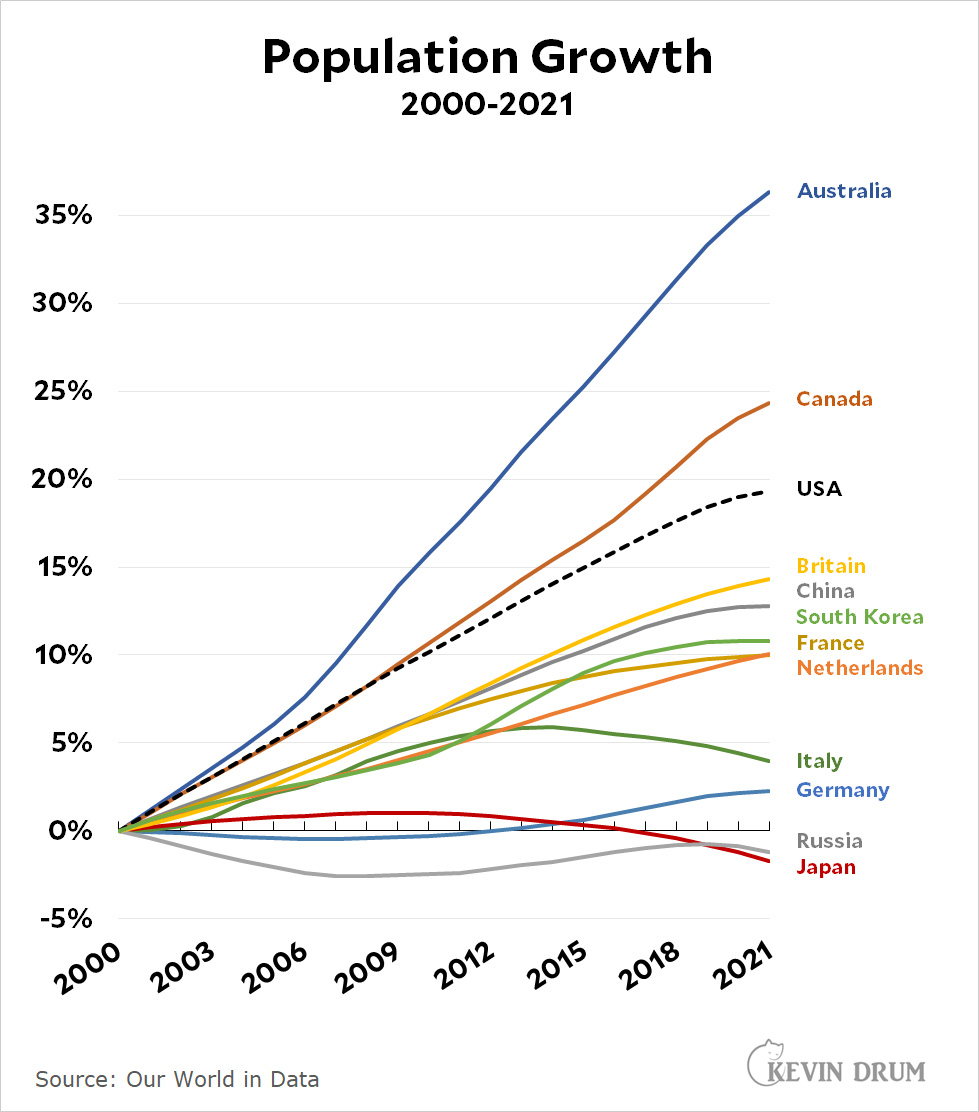 Unlike many rich countries, the US is still growing at a brisk pace. Here's education:
Unlike many rich countries, the US is still growing at a brisk pace. Here's education:
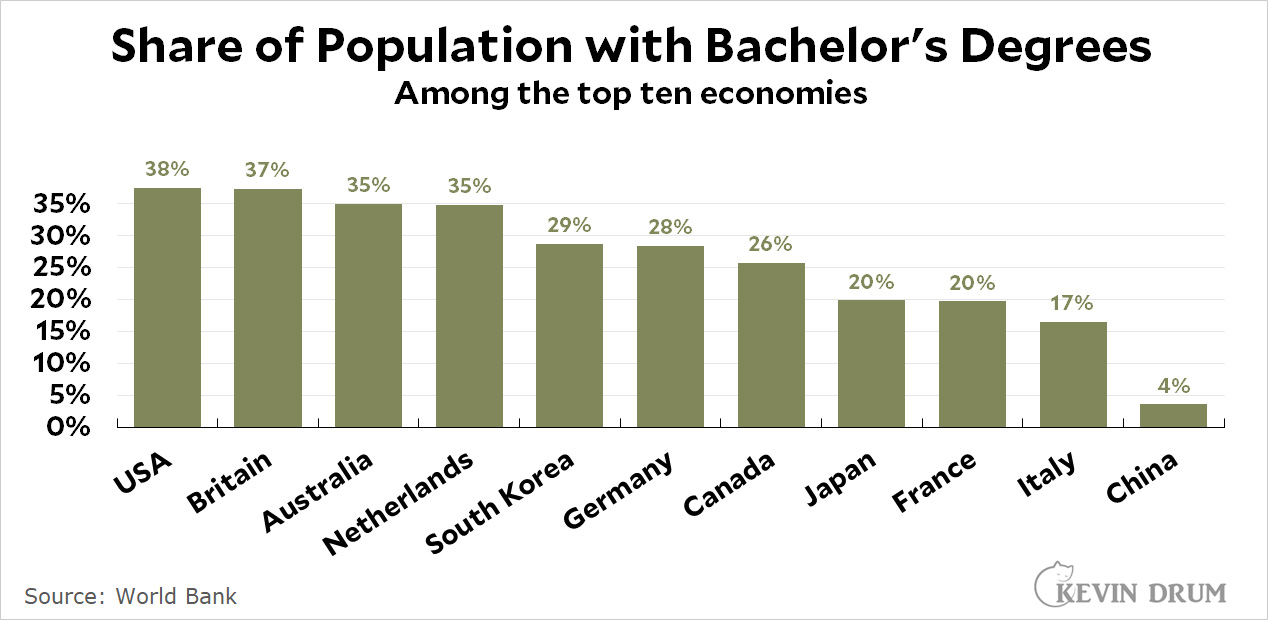
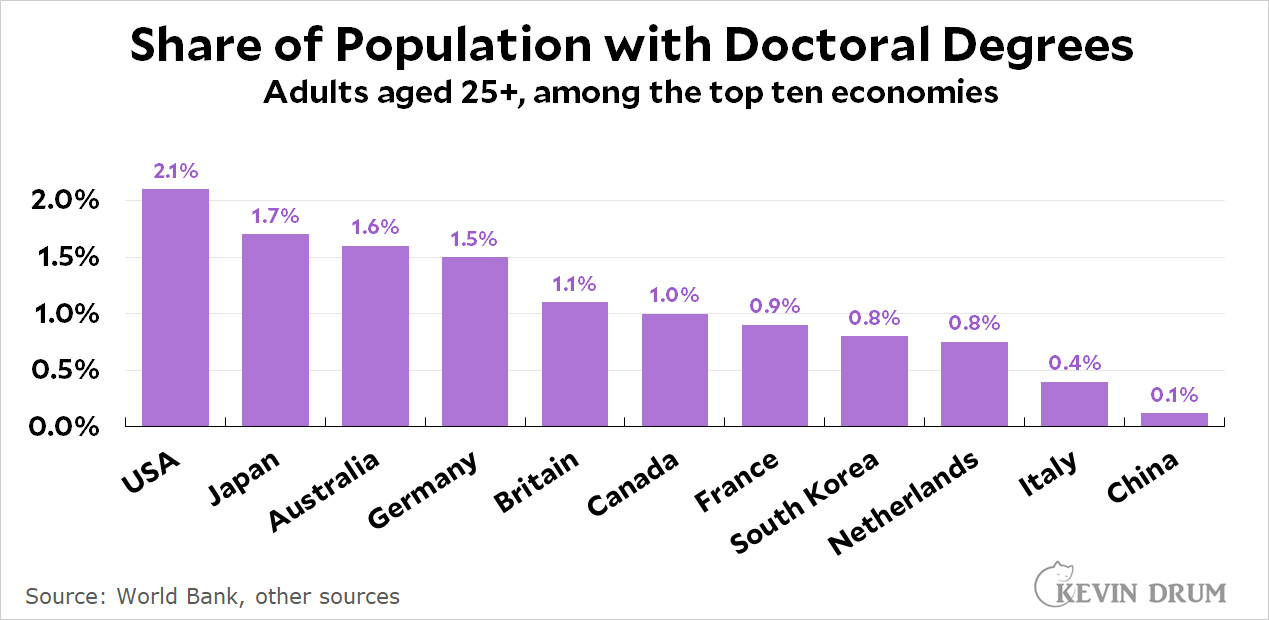 Finally, I was intrigued by this tweet quoting Larry Summers:
Finally, I was intrigued by this tweet quoting Larry Summers:
``What we get from China is an airport. What we get from the US is a lecture." - Larry Summers, describing convo w/leader of developing country and the loss of US global influence, in intv w/@DavidWestin today#China #BeltandRoad #USdollar
— Gabrielle Coppola (@gablova) April 14, 2023
This might be true, but it's largely because we've given developing countries so many airports already and it hasn't worked out so well. China is discovering the same thing today with its Belt and Road initiative: eventually there comes a time when your clients can't pay back their loans, and then what? Write off the investment and never go back? Demand repayment and become the bad guy? In terms of influence this is a losing game.
Also, while it might not be politically correct to point this out, Africa and South America combined account for 8% of world GDP. Does it really matter who has more influence in these places?
In summary: The dollar remains the world's reserve currency and shows no signs of that turning around anytime soon. Our GDP is the largest among big countries and our growth rate is second highest. Our military spending is wildly higher than anyone in the world. Our population growth is among the highest among rich nations. We have the most highly and broadly educated workforce. And while we may or may not be losing influence in the global south, does it really matter either way except at the margins?
There are plenty of things you can nitpick here, and plenty of qualitative arguments you can make against American supremacy. It's also clear that China has every intention of trying to match the US as a global superpower. But it has a very long row to hoe before it gets there. And by the time it matters, everything is going to depend on leadership in AI anyway—which is yet another area where the US has a dominant position.
Anyway, this is the case for the US retaining its crown as by far the most powerful nation in the world for a good long time. Aesthetics aside—de gustibus, after all—it's hard to make an argument for any other country being a better place for a young person to live for the rest of their life.
¹I excluded petrostate countries from this list for obvious reasons, though it doesn't change things much anyway.
²South Korea's growth rate has slowed considerably since 2010 and is now only slightly higher than ours.